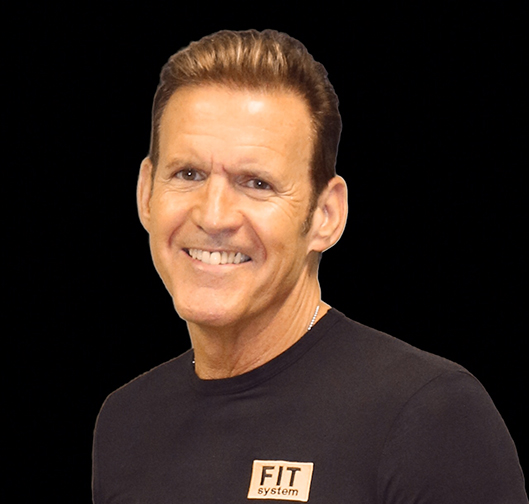Bob Perry didn’t think he had a choice. Born in northeast Ohio, trucking was in Bob’s blood. Between his father and two brothers, the Perry family has 60 years of driving experience—or 61 if you include Bob’s one year behind the wheel.
In 1972, family tradition called for Bob to climb in the cab of his first (and only) truck. He did as was expected. For about a year he drove… and thought… and thought… and drove some more. All that thinking allowed Bob to reach a swift conclusion.
“Trucking just wasn’t for me,” he said. And so ended Bob Perry’s career on the highways. But fate had the final word. He might have been finished driving a truck, but he was far from finished with the trucking industry.
“I soon became involved in health and wellness,” he said. By 1975, Bob had worked in the healthcare industry and for several years after managed and owned fitness centers. But being so close to the trucking culture, he knew drivers as people, not just anonymous faces he passed on the interstate, and he understood the truckers’ lifestyle.
“I realized my experience in the personal health arena could be applied to improving truckers’ lives,” Bob said. “Drivers don’t have opportunities to train, join a fitness center, or even shop at health food stores.”
Shifting gears
About 20 years ago, Bob combined his knowledge of personal health and trucking to provide information to medical clinics with substantial numbers of truck driving patients. But it was a brief encounter in 2008 that set Bob’s wheels turning. The connection between driver health and the trucking industry’s needs became clear.
Bob stood outside a Georgia truck stop chatting with a couple of drivers. The subject turned to lifestyles on the road. The drivers weren’t particularly satisfied with their health status, so Bob provided a few tips they could put to immediate use. They followed Bob’s lead and later told him those tips led to notable health improvements.
“A couple of drivers for Covenant Transport out of Chattanooga, Tennessee, caught wind of the advice I offered and asked if I could help them as well,” Bob said. “They convinced Covenant to let me work with a couple of other drivers. Before long I was working with all Covenant drivers.
Bob built on his strong start and grew his list of clients. Sherwin-Williams, Greyhound Bus Lines, and Hogan Transportation soon signed on.
“The growth really validated what I was doing,” Bob said. His understanding of truck drivers and their families also helped him realize the payoff of his efforts.
“Drivers’ families depend on them,” he said. “When parents can’t pass a DOT exam, and the family loses a source of income, it impacts both adults and kids.” He noted that truck driving is a unique occupation and lifestyle. When a driver can no longer work, adjustment is difficult.
“Not just any job is going to provide satisfaction to someone who has been on the road for years,” Bob said. Even without fear of job loss, the lonely life of driving takes its toll in the form of depression and other mental health issues, conditions Bob is incorporating into his programs.
In 2009, Bob founded “Rolling Strong,” an initiative encouraging drivers to become health-conscious. Rolling Strong worked with travel centers to install self-administered “StayHealthy” stations where drivers could check weight, BMI, blood pressure, and vision. As the stations became widely available, Rolling Strong developed the first truck driver-focused wellness app for the iPhone. By 2012, Freightliner took note of Bob’s work and asked him to join them in developing the first in-cab gym, “The Fit System.” He soon became in great demand as an advocate for trucker wellness.
One thing Bob has learned when presenting health information to a group is to keep the message simple and speak in terms that hit home with his audience.
Rather than a narrative about the importance of wellness, for instance, Bob may tell a group to take a “peek under their personal hoods,” suggesting drivers should “check their personal oil and gauges” just like they do those in their trucks. Or, he may compare drivers’ awareness of truck maintenance needs to that of their health. “If a light is out on a truck,” Bob said, “the driver will see that it is fixed quickly. On the other hand, if a health-related warning light is going off, chances are they’ll ignore it.”
“My job is to help drivers make the best choices while on the road so they can get home safely each and every trip,” Bob said.
The 90-day window
Bob’s company, Health in Transportation, has launched a new initiative, “Fit to Pass.” The program’s goal is to provide drivers information to remain healthy year-round. If they do remain healthy, when it comes time to renew their CDLs and pass DOT medical exams, they won’t have to worry—something creating more stress and adding to health problems. “Fit to Pass” was largely inspired by a former Truckload Carriers Association (TCA) driver of the year who visited with Bob, noting his poor health had resulted in his being issued a 90-day card.
“Here is a national driver of the year—he’s been driving for 47 years with over 5 million accident-free miles—and he’s stuck with a 90-day card,” Bob said. “The industry can’t afford to lose drivers with his level of experience and skill, especially with the problems carriers have in recruiting and retaining new drivers.”
Bob coached the driver to make some simple changes in his lifestyle over the 90 days he had before his renewal would be reconsidered. The result? A loss of 35 pounds and a new one-year card.
“Fit to Pass” capitalizes on the driver of the year story, and while the program doesn’t encourage drivers to wait until crunch time to get healthy, it is designed to put on a “full press” as exam dates approach. To increase his program’s effectiveness, Bob has teamed up with Espyr, a nationwide company conducting Employee Assistance Programs (EAP) for many organizations.
“Espyr has the large call center, professional coaches and counselors and ability to touch base with drivers throughout the year,” Bob said. “Drivers can call any time they need advice or assistance.” Espyr’s services are available to fleets at the cost of one dollar a month per enrolled driver.
“Based on experience, I know that we’ve saved carriers hundreds of thousands of dollars in driver turnover costs alone. A dollar a month is insignificant compared to a lawsuit resulting from an accident in which driver health plays a role,” Bob said. He also notes that regardless of how much money a carrier invests in technology to increase safety, it is the driver who makes the difference. Espyr also provides mental health services, something Bob sought as he looked for a partner.
Mental fitness—silent key to wellness
“There is so much depression in the industry,” he said. Espyr has provided mental health services for over 30 years; in fact, Espyr personnel were on-scene at the El Paso, Texas, Wal-Mart on August 3 following the shooting that killed 22 people and injuring dozens. The staff offered immediate counseling to employees, customers and first responders, helping them process what they had witnessed and preparing them for what they might expect in the months and years ahead. But drivers don’t need to witness a traumatic event to develop mental health issues; sometimes the loneliness of the road is enough. Solutions may be as simple as driving with a pet companion, usually a dog.
“If I ask a group how many in the room travel with dogs,” he said. “usually about 40% of the hands go up. Then I ask them if they fed their dogs that morning. The same hands go up. Finally, I ask if they fed their dogs a donut and a cup of coffee for breakfast, then lit up a cigarette for them.” Bob’s point hits home. “Drivers are more concerned about their pet’s health than they are their own wellness,” he said.
While Bob Perry hasn’t driven a truck in nearly 40 years, he remains on the road—or at least in the air—logging over 125,000 flight miles a year. He conducts orientation sessions and classes across the country up to three weeks out of each month. And he remains active in promoting driver health and wellness within the industry. Bob served two years as vice-chair of the American Trucking Associations’ Health and Wellness working group followed by four years in the chairman’s slot. He remains active with the organization and is also involved with the American Bus Association Safety Council (after all bus drivers face the same long hours on t the road, and they carry the nation’s most precious cargo).
OTR health in an industry taking notice
After being featured on many national television and radio broadcasts as well as in the nation’s largest newspapers and magazines, most recently, TravelAmerica Centers (TA) named Bob its “wellness ambassador.”
“TA requires all of its locations to provide some sort of fitness area for drivers,” he said. “A walking trail, a basketball court, even a horseshoe pit—anything encouraging exercise is great.” TA also provides health clinics at about 20 locations, with more being added. And access to healthcare while on the road is problematic for truckers and leads them to put off seeking the care they need.
“CVS has about 1,500 locations where offering health care services ranging from DOT exams to access to doctors,” he said, noting that at this time the chain is probably a trucker’s best choice when needing immediate health care.
So, the question is, as a driver, are you fit to pass? If today is the deadline for your DOT medical exam, can you walk in worry-free, or would it be best if you just didn’t show up? If your answer is the latter, that’s why The Trucker and Bob Perry are joining forces.
In future issues of The Trucker, Bob will write a column providing tips you can put to immediate use to improve your health along with information and stories to inspire you to remain focused on wellness
As you read, remember, simple lifestyle changes can be the difference between losing your CDL and being “Fit to Pass.”
Since retiring from a career as an outdoor recreation professional from the State of Arkansas, Kris Rutherford has worked as a freelance writer and, with his wife, owns and publishes a small Northeast Texas newspaper, The Roxton Progress. Kris has worked as a ghostwriter and editor and has authored seven books of his own. He became interested in the trucking industry as a child in the 1970s when his family traveled the interstates twice a year between their home in Maine and their native Texas. He has been a classic country music enthusiast since the age of nine when he developed a special interest in trucking songs.








